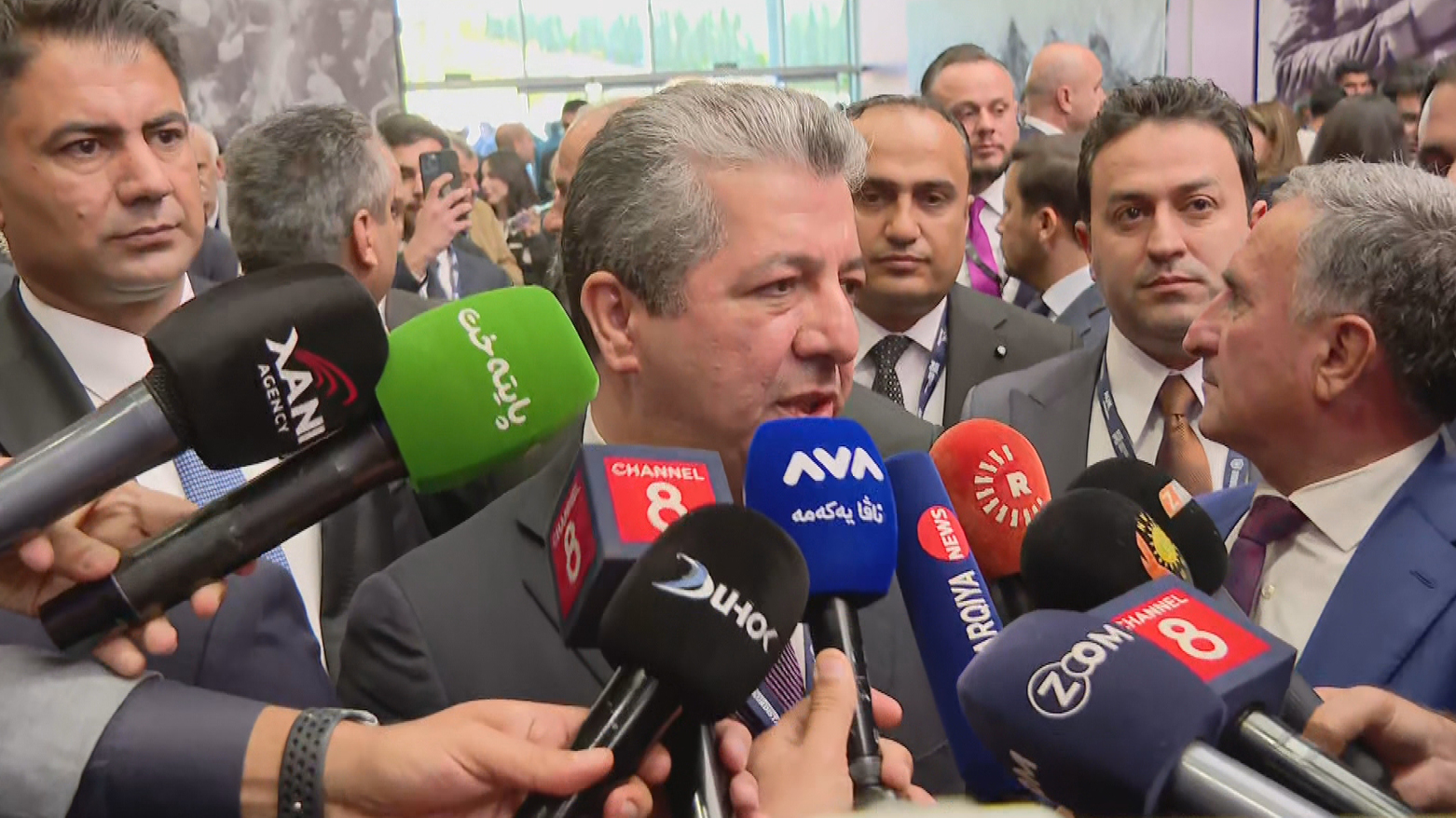Kurdistan PM Barzani Urges Kurdish Rapprochement, Calls for Reform of Iraq’s Electoral Law
Kurdistan Region premier highlights participation of SDF and KNC leaders as a “positive sign,” calls for Kurdish unity.

ERBIL (Kurdistan24) — Kurdistan Region Prime Minister Masrour Barzani on Wednesday said the central goal of the sixth Middle East Peace and Security Forum (MEPS 25) is to help advance “genuine peace” across the Middle East, emphasizing that the presence of the Syrian Democratic Forces (SDF) and the Kurdish National Council (KNC) at this year’s gathering sends an encouraging signal for reconciliation efforts in Syria and beyond.
Prime Minister Barzani told reporters that the broad participation of senior SDF and KNC leaders reflects a shared commitment to dialogue at a critical moment for the region.
He expressed hope that their engagement at MEPS “will contribute to achieving real and lasting peace in the Middle East.”
Barzani stressed the importance of improving intra-Kurdish relations, saying: “The sooner Kurdish sides draw closer to one another, the better. There may still be issues requiring further dialogue, but there is a common desire among all sides to move toward unity.”
Regarding the formation of the next Kurdistan Regional Government (KRG) cabinet, Barzani said the delay is not due to the KDP. “From the beginning, the KDP has wanted the new cabinet to be formed quickly. Other sides can testify to this,” he said.
“Those who have delayed the process must now take responsibility. I hope there will be no further postponement.”
Speaking on the formation of the next Iraqi federal government following the recent elections, the Prime Minister said efforts are ongoing.
“Although it is still early, we held meetings yesterday with several Iraqi political leaders who achieved success in the vote. We are listening to all sides to determine our next steps,” he noted.
Barzani also reiterated his view that Iraq’s electoral law must be amended, arguing that the current system lacks fairness and distorts voter representation.
He pointed to the vote distribution results, noting that the Kurdistan Democratic Party (KDP), despite winning more than 1.1 million votes, secured only 27 seats, while other blocs with significantly fewer votes obtained an equal or greater number of seats.
“There is no justice in this allocation of seats,” he said. “This is a legal problem, and the law must be changed.”
Calls for electoral reform gained new momentum this week at MEPS 2025 in Duhok, where senior Iraqi and Kurdish leaders sharply criticized the law under which Iraq’s latest parliamentary elections were held.
President Masoud Barzani on Tuesday, described the system as “an unjust law with many flaws,” arguing that it denied rights to many deserving candidates while benefiting others unfairly.
“We will seriously work with partners to correct this law because, in reality, it lacks any justice,” President Barzani said during the forum.
On the same day, Iraqi Prime Minister Mohammed Shia’ al-Sudani, speaking in a session at the event, acknowledged Kurdish concerns and signaled readiness for reform.
He highlighted vote discrepancies affecting his own Coalition of Reconstruction and Development, which received 1,317,000 votes but won fewer seats than expected.
“We stand with President Barzani on the issue of wasted votes,” Sudani said, emphasizing the need to curb fragmentation and manipulation. He noted that parliament has the authority “to prepare a clearer proposal to establish a fair law that reflects citizens’ votes and prevents manipulation.”
The combined statements from Barzani, Sudani, and Kurdish parliamentary leaders suggest that electoral reform is poised to become a central political priority in Baghdad in the coming months.
MEPS 2025 continues in Duhok with further sessions examining Syria, the Kurdistan Region, Iraq, and broader regional security, offering a platform for senior political, academic, and diplomatic leaders to discuss long-term peace and stability in the Middle East.
Organized annually at the American University of Kurdistan in Duhok province, in the Kurdistan Region, the forum is known for its open, in-depth discussions on regional stability, counterterrorism coordination, economic diversification, climate challenges, energy transitions, and the future of partnerships across the Middle East.